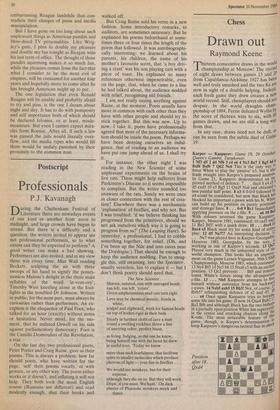Postscript
Professionals
P.J. Kavanagh
During the Cheltenham Festival of Literature there are nowadays events of one kind or another from noon to midnight, and large crowds have begun to attend. But there is a difficulty and a question: the writers invited to appear are not professional performers, so to what extent can they be expected to perform? A good writer can make a bad showing. Performers are also invited, and in my view these win every time: Max Wall reading Beckett, sculpting the air with three swoops of his hand to signify the posses- sionless Malone's delight in the three main syllables of the word in-vent-ory'; Timothy West kneeling alone at the foot- lights as the troubled Dr Johnson. Writers in public, for the most part, must always be curiosities rather than performers. An ex- ception is the eloquence of Paul Foot, who talked for an hour (exactly) without notes or hesitation. Never mind, for the mo- ment, that he enlisted Orwell on his side against parliamentary democracy; Foot is the Camille Desmoulins of the Revolution, a star.
On the last day two professional poets, Peter Porter and Craig Raine, gave us their poems. This is always a problem: how far should poets, who have written for the page, 'sell' their poems vocally, or with gesture, or any other way. The poem either works or it doesn't, and inflating it will not help. They both took the usual English course (Russians are different) and read modestly enough, shut their books and walked off.
But Craig Raine sold his verse in a new fashion. Some introductory remarks, to auditors, are sometimes necessary. But he explained his poems beforehand at some- times three or four times the length of the poem that followed. It was autobiographi- cally interesting: we learned about his parents, his children, the name of his mother's favourite scent, that 'a boy driv- ing a crust' was his son playing cars with a piece of toast. He explained so many references otherwise impenetrable, even on the page, that, when he came to a line he had talked about, the audience nodded with relief, recognising old friends.
I am not really saying anything against Raine, at the moment. Poets usually have more in common with each other than they have with other people and should try to stick together. But this was new. Up to now, I take it, poets have professionally agreed that most of the necessary informa- tion should be inside the poem. Perhaps we have been denying ourselves an indul- gence, that of reading to an audience we have put one jump ahead of us. I shall try it.
For instance, the other night I was reading in the New Scientist of some unpleasant experiments on the brains of live rats. These might help sufferers from Parkinson's Disease so it seems impossible to complain. But the writer sounded too unaware of the rats. Surely we were once in closer connection with the rest of crea- tion? Elsewhere there was a mechanistic 'explanation' of fireflies, and why not. But I was troubled: if we believe thinking has progressed from the primitives, should we not ask ourselves which way it is going to progress from us?' (The Leaping Hare). So yesterday, a professional, I had to cobble something together, for relief. (Oh, and I've been up the Nile and into caves near the Dordogne.) That should be enough to keep the audience nodding. Fun to smug- gle this, still steaming, into the Spectator, usually verseless; fun to explain it — but I don't think poetry should need that.
The New Scientist
Shaven, sutured, rats with outraged heads run left, run left, 'rotate'.
Given amphetamines mad rats turn right.
Love may be chemical merely; fiends in white, scalpel and clipboard, work for human heads on top of bodies rigid as their beds . . .
Steady in furthest clefts of cave a man round a swelling rockface threw a line of unerring ochre, perfect bison, as living, bulging, as the one he knew, being himself one with the beast he drew in useful love. 'Today we know more than such fearfulness: that lucifrase splits to smaller molecules which produce photons of light — your fire in fireflies . . .
We would use monkeys, but for their expense, although they die on us. But they will work. Draw, if you must. We hunt.' On dark plaster of Pharaohs monkeys mock and dance.














































 Previous page
Previous page